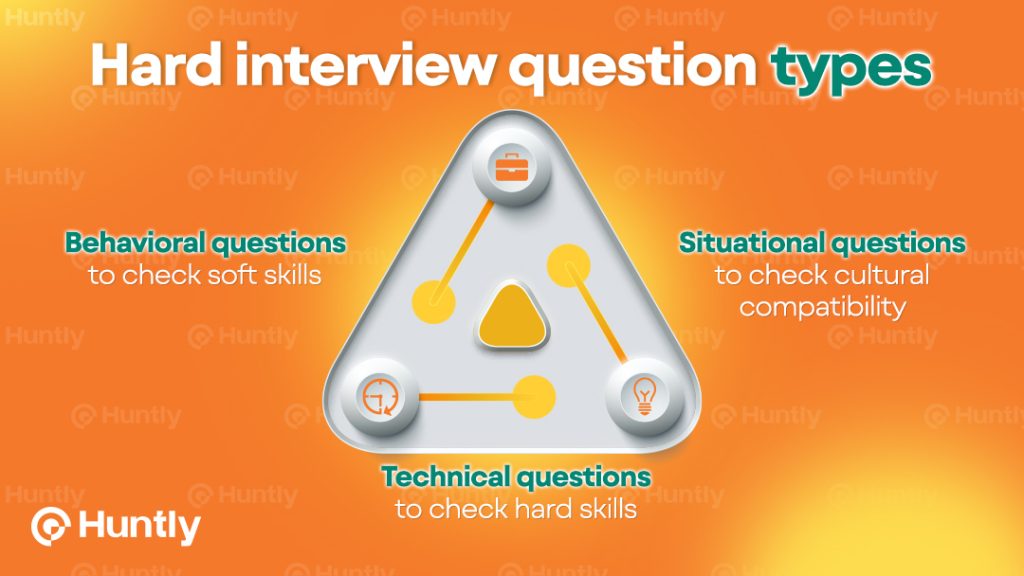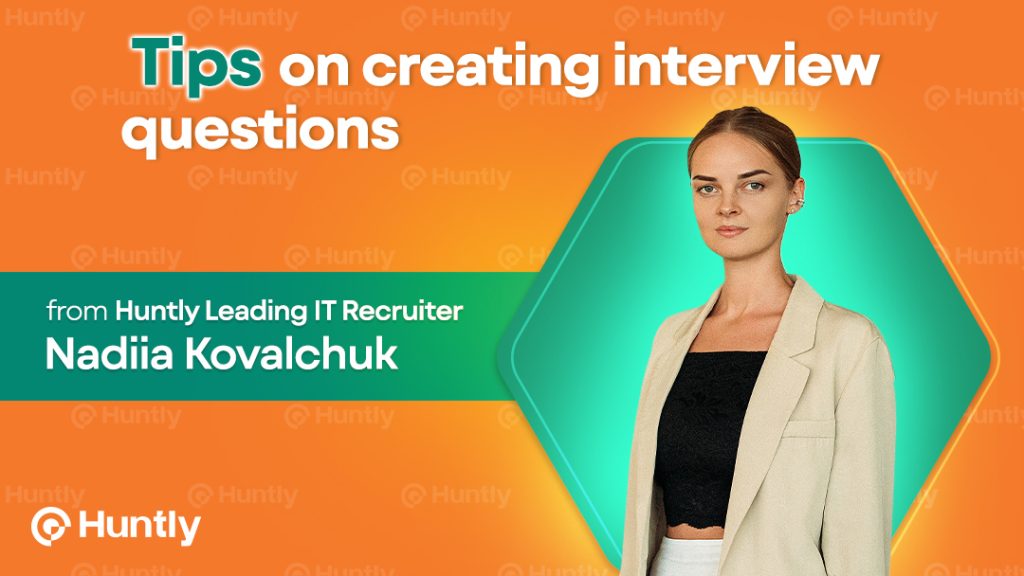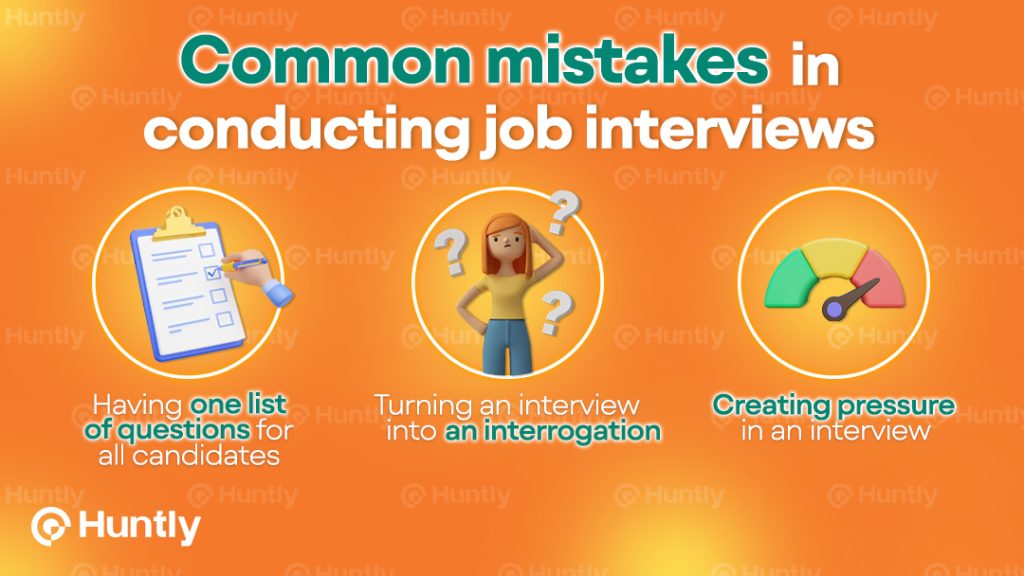Hard interview questions: types and examples
When asking questions in an interview, you’ll need to challenge job seekers to get insights into their professional and personal skills. Yet before you switch to hard topics, it’s important to build a rapport with your applicant, and this is where general questions come in handy. Here are some ideas on how you can start your conversation:
- Can you describe yourself in one sentence?
- Can you list your strengths and weaknesses?
- What do you consider your biggest life achievement?
- Why did you decide to change your previous workplace?
- What job opportunities are you seeking?
While these aren’t difficult interview questions to prepare for, candidates still give you valuable information when answering them. From their answers, you discover life and career goals, values, and some main characteristics. As a result, you’ll be able to get a first impression of whether or not a person suits your position.
Once you finish the introductory part, it’s time to raise the stakes and move to something more challenging. There are three difficult question types that allow you to garner the maximum amount of information about an IT professional in a short time.

Technical questions
Of course, technical questions vary from position to position. Depending on who you are hiring at the moment — a full-stack developer, cloud architect, or scrum master — tech questions should reflect the specific qualifications of each role. Just to give an example, let’s have a look at several technical questions for a full-stack developer:
- What tools do you use as a full-stack developer?
- What can you do to improve website performance and load time?
- Can you explain the difference between REST and GraphQL?
- What’s the difference between an abstract class and interface?
- Do you have experience writing unit tests?
Behavioral questions
Once you’re done with the technical part, you can cover the interviewee’s soft skills, stress-resistance levels, and demeanor in the workplace. This is where behavioral questions are useful. They aim to demonstrate how job seekers managed particular situations in the past and give you an insight into how they will behave in a future IT role.
- Can you tell us about a situation when you disagreed with your manager and how you handled it?
- What tricky tasks were there in your career and how did you manage to complete them?
- Can you tell us about a situation when you were asked to do a task that contradicted your personal values?
- Did you have to provide negative feedback to your team members? How did you handle this?
- Did you have to work with a colleague you didn’t like? How did you manage your cooperation?
Situational questions
These types of difficult questions for interview help job seekers imagine a hypothetical situation and speculate on how they would act. Try to add as many situational details as you can to make it feel real. When analyzing responses, you will understand how they might behave in critical circumstances and whether their approach to problem solving matches your vision of a perfect candidate.
- What would you do if your manager asked you to complete a task that is out of your responsibilities?
- Imagine that your manager is going to make a wrong decision that might harm the company. How would you act?
- Imagine that you have two high-priority tasks with the same deadline and you can finish only one of them on time. What would you do?
- How would you act if you were about to miss a deadline for an important project due to personal circumstances?
- How would you react if company management initiated changes you didn’t like, for example, changed the type of wages that would temporarily affect your income?
Now that you know some tough questions to ask candidates, let’s move further and see how you can get the maximum benefit from asking them.
Benefits of asking tough questions
While job interviews can be limited to simple questions concerning applicants’ general information and previous experiences in IT, carrying out tough interviews helps employers analyze candidates better and get an understanding of their:
- problem-solving and critical thinking skills;
- resilience and ability to work under stress;
- motivation to grow as a professional;
- compatibility with your corporate values;
- communication skills.
As a result, challenging candidates to answer difficult questions increases the chances of hiring a top tech professional who will be a good fit for your company, share your values, and become a valuable team member who’ll lead your business to prosperity.
Recommendations for creating hard interview questions
You can find loads of interview questions on the Internet, but not all of them will suit your goals. That’s why you might want to come up with a specific scenario and select particular interview questions to ask candidates.

At Huntly, we know the ins and outs of the interviewing process. We handle the CV pre-screening stage and conduct interviews so that employers who post jobs on our platform get a list of the most relevant tech talents. Our candidates' quality is so high that 4 out of 5 software developers sent to a client get an invitation for the next interview. With my experience of 5+ years in recruiting software developers for IT companies, I have listed some tips that you can use when generating tough questions for interview.
- Focus on a position. With an open position in mind, make sure that all your questions reflect vacancy requirements and help identify the skills a candidate should have to successfully perform their duties.
- Check both hard and soft skills. When looking for a new team member, it’s essential to select the person who will stay with your company for the long term. You’re likely seeking long-term cooperation in order to optimize the budget, time, and effort you invest in recruiting. Thus, make sure that your new colleague will not only be a top professional but also a good cultural fit.
- Prepare open-ended questions. Asking yes/no questions doesn't tell you anything about an applicant. What you want to achieve during an interview is to make candidates express themselves to the maximum, and this is where open-ended questions work best.
- Don’t forget about the desired result. The main goal of each interview is your ability to decide if a candidate suits your open position. That’s why all your questions should help you get only the necessary information for making a hiring decision.
Common mistakes to avoid in asking hard questions
Just preparing a list of the most challenging interview questions and bombarding your candidates with them isn’t enough for a good interview. Here are some common mistakes you should be aware of when talking to job seekers.

- Having one list of questions for all applicants. While some questions can be the same for all — like those aiming to check cultural fit with your company — others can (and should) vary. You’re likely to expect different things from Middle and Junior JavaScript engineers as well as put more responsibilities on people in managerial or executive roles.
- Turning an interview into an interrogation. Interviews should be equally informative for both parties, and you should give your candidates a chance to ask questions, too. The best possible interview resembles a conversation between two professionals after which each of them can decide if they want to cooperate.
- Creating pressure in an interview. Keep in mind that in a highly competitive job market, interviews put stress on candidates, so they might be nervous or confused even when they know the answer. Let them think for a moment before they communicate their best possible response and schedule enough time to conduct a comprehensive interview with no hassle.
In conclusion
Asking job seekers difficult interview questions allows you to go beyond just checking general information about them. By challenging candidates with tricky behavioral and situational questions, you go deeper into both their skills and motivations, thus get more information for making the right hiring decisions.
Post your vacancies on Huntly and let our team do the mundane pre-screening instead of you. Then you’ll be able to enjoy meaningful conversations only with the best tech talents!







